Great Sumerian God Enki: Creator, Protector Of Humanity, Brilliant Scientist And Patron Of Craftsmen And Artisans
A. Sutherland - AncientPages.com - EN.KI ("Lord of Earth"), was the Sumerian water god of Eridu, located in the southern wetlands of what is today Iraq.
He was also the god of wisdom, creator, protector of humanity and patron of craftsmen and artisans.
Enki was known under other names, such as the Akkadian-Babylonian, Ea ("Whose House Is Water"), or NU.DIM.MUD (Nudimmud), "He Who Fashions Things". He was wise and skillful at all crafts; he was a brilliant scientist, geneticist, and engineer.

Enki with two streams of water erupting from his shoulders - Adda Seal (c. 2300 BC), Image credit: British Museum
Along with Anu, the god of heaven, his brother Enlil, the god of air, and Ninhursag, the earth mother, Enki was one of the most powerful gods of the Sumerian pantheon.
In myths found on Sumerian texts, Lord Enki is described as “he of exceptional knowledge, who knows the divine powers in heaven and earth, who from his own dwelling already knows the intentions of the gods…”
Enki is associated with the city of Eridu in southern Mesopotamia. In Sumerian mythology, Eridu (E.RI.DU - ‘Home in the Faraway Built’) was one of the earliest and most sacred cities of the Sumerians. Enki was worshiped at Eridu and there he had his his temple, E-abzu (‘house of the abzu’), which was also known as E-engur-ra (‘house of the subterranean water’).
In Mesopotamian art, Enki is represented as a seated god with a long beard, who wears a cap with horns and a long robe. Streams of water flow from his arms to the ground, sometimes with fish swimming along with the flow, which symbolizes the subterranean waters of the abzu.

Ea (seated) and attendant deities, Sumerian cylinder seal, c. 2300 BC. Image credit: Pierpont Morgan Library, New York
According to the Babylonian creation epic, the 'Enûma Elish', taken from the library of Assurbanipal (c 630 BC), Enki lived in abzu (Akkadian apsû) with mythical creatures, such as the seven meditators who were created to teach humanity and Isimud (Ismus), a messenger god with two faces looking in opposite directions, who was the servant of Enki. The abzu, which was a magic place full of divine powers, was frequently visited by gods who wanted to steal some of Enki’s powers.
The great god Enki was not a ruler himself but gave rulers what they needed most – knowledge and intelligence and he divided the speech to humans.
And so the ancient Sumerian texts say:
“Enki, the Lord of abundance, of trustworthy commands,
The Lord of wisdom, who understands the land,
The leader of the gods,
Endowed with wisdom,
the Lord of Eridu
Changed the speech in their mouths, [brought] contention into it,
Into the speech of man that had previously been one…”
Enki created fertile lands and cities of Mesopotamia. He created fish in rivers and wild animals in the steppes. He provided seeds of wheat, bean, and barley and raised corn on the fields. He created sheep and cowsheds, brought civilization to humankind and taught humans how to construct canals and plan temples, ‘putting their foundation pegs in the right places.
Enki is mentioned in a great number of ancient myths that originate from Southern Iraq to the Levantine coast; we mention only a few of them. In the myth “Adapa and the South Wind”, Enki (Ea) helps humanity keep the gift of magic and incantations and according to the Sumerian epic poem entitled “Inanna and Enki”, he was the one who dedicated the art of writing to the people of earth and he was the keeper of the divine powers called "Me", the gifts of civilization and he controlled them.
In the Sumerian myth “Enki and the World Order,” Enki is said to have fixed national boundaries and assigned gods their roles. It is also mentioned that the Anunnaki several times, they ‘do homage’ to the god Enki and sing his praise, they ‘take up their dwellings’ in the midst of the people of Sumer, in the cities and in the countryside, and twice it is said that they ‘decree the fates of mankind…’
Written by – A. Sutherland AncientPages.com Staff Writer
Copyright © AncientPages.com All rights reserved. This material may not be published, broadcast, rewritten or redistributed in whole or part without the express written permission of AncientPages.com
Expand for referencesReferences:
Kriwaczek, P. Babylon: Mesopotamia and the Birth of Civilization
Ancient Mesopotamian Gods and Goddesses
Leick, A Dictionary of Ancient Near Eastern Mythology
More From Ancient Pages
-
 Evidence Of A Hybrid Population Of Neanderthals And Modern Humans Discovered At La Cotte De St Brelade
Archaeology | Feb 9, 2021
Evidence Of A Hybrid Population Of Neanderthals And Modern Humans Discovered At La Cotte De St Brelade
Archaeology | Feb 9, 2021 -
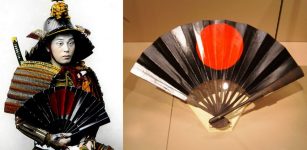 Innocent-Looking Japanese War Fan – Surprise Weapon Used By The Samurai And Female Ninja
Ancient History Facts | Mar 29, 2018
Innocent-Looking Japanese War Fan – Surprise Weapon Used By The Samurai And Female Ninja
Ancient History Facts | Mar 29, 2018 -
 Hesperides – Greek Nymphs Who Guarded Fabled Garden With Divine Apples Of Immortality
Featured Stories | Jun 4, 2020
Hesperides – Greek Nymphs Who Guarded Fabled Garden With Divine Apples Of Immortality
Featured Stories | Jun 4, 2020 -
 Devil’s Advocate – Ancient Phrase Traced To The Roman Catholic Church
Ancient History Facts | Nov 19, 2018
Devil’s Advocate – Ancient Phrase Traced To The Roman Catholic Church
Ancient History Facts | Nov 19, 2018 -
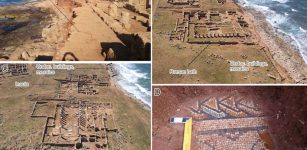 Archaeological Sites At Risk From Coastal Erosion On The Cyrenaican Coast Of Libya
Archaeology | Apr 15, 2023
Archaeological Sites At Risk From Coastal Erosion On The Cyrenaican Coast Of Libya
Archaeology | Apr 15, 2023 -
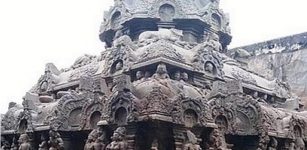 Vettuvan Koil Temple Spectacular Monolith Dedicated To Lord Shiva And Built By Pandya Dynasty
Featured Stories | May 25, 2021
Vettuvan Koil Temple Spectacular Monolith Dedicated To Lord Shiva And Built By Pandya Dynasty
Featured Stories | May 25, 2021 -
 Capoeira: Ancient Martial Art Disguised As A Dance Became A Symbol Of Resistance To Oppression
Ancient History Facts | Jun 8, 2018
Capoeira: Ancient Martial Art Disguised As A Dance Became A Symbol Of Resistance To Oppression
Ancient History Facts | Jun 8, 2018 -
 Viking Age Mass Grave Reveals Gruesome Discovery At Historical Village Of Repton, England
Archaeology | Feb 4, 2018
Viking Age Mass Grave Reveals Gruesome Discovery At Historical Village Of Repton, England
Archaeology | Feb 4, 2018 -
 Hairy Snail Discovered In 99-Million-Year-Old Amber
Archaeology | Oct 29, 2022
Hairy Snail Discovered In 99-Million-Year-Old Amber
Archaeology | Oct 29, 2022 -
 Humans Were Living Around Fort McMurray, Alberta 13,000 Years Ago – Scientists Reveal
Archaeology | Aug 3, 2022
Humans Were Living Around Fort McMurray, Alberta 13,000 Years Ago – Scientists Reveal
Archaeology | Aug 3, 2022 -
 Tiny Points Made By Homo Sapiens 54,000 Years Ago Found In Mandrin Cave
Archaeology | Feb 23, 2023
Tiny Points Made By Homo Sapiens 54,000 Years Ago Found In Mandrin Cave
Archaeology | Feb 23, 2023 -
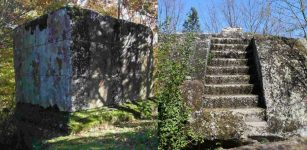 Mysterious Etruscan Stone Structures Hidden In The Malano Forest – Evidence Of Ancient Unknown High-Tech Knowledge?
Featured Stories | Dec 19, 2020
Mysterious Etruscan Stone Structures Hidden In The Malano Forest – Evidence Of Ancient Unknown High-Tech Knowledge?
Featured Stories | Dec 19, 2020 -
 Chilling Story Of Glamr Who Became A Draugr, A Living Dead – Scary Yule Haunting
Christmas Traditions | Dec 7, 2021
Chilling Story Of Glamr Who Became A Draugr, A Living Dead – Scary Yule Haunting
Christmas Traditions | Dec 7, 2021 -
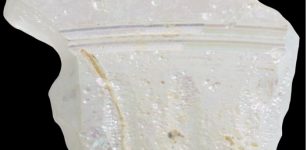 New Method Distinguishes Between Egyptian And Palestinian Glass During Roman Times
Archaeology | Jul 13, 2020
New Method Distinguishes Between Egyptian And Palestinian Glass During Roman Times
Archaeology | Jul 13, 2020 -
 Children Of Lir And Aoife’s Curse – Celtic Legend That Inspired The Swan Lake Ballet
Featured Stories | Feb 8, 2024
Children Of Lir And Aoife’s Curse – Celtic Legend That Inspired The Swan Lake Ballet
Featured Stories | Feb 8, 2024 -
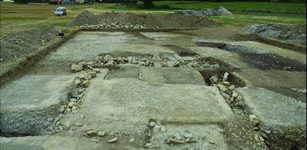 Stone Homes Of Europe’s First Megalithic Builders Discovered
Archaeology | Feb 22, 2023
Stone Homes Of Europe’s First Megalithic Builders Discovered
Archaeology | Feb 22, 2023 -
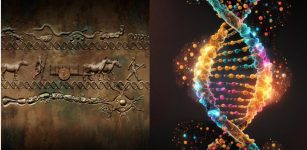 Ancient DNA Reveals How Yamnaya People Re-Wrote Northern Europeans’ Genetic Story 5,000 Years Ago
DNA | Jan 12, 2024
Ancient DNA Reveals How Yamnaya People Re-Wrote Northern Europeans’ Genetic Story 5,000 Years Ago
DNA | Jan 12, 2024 -
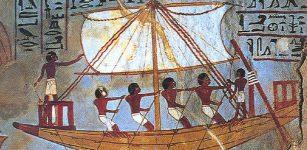 Mysterious Sherbrooke Stones – Did Africans Visit North America 2,500 Years Ago?
Artifacts | Nov 23, 2017
Mysterious Sherbrooke Stones – Did Africans Visit North America 2,500 Years Ago?
Artifacts | Nov 23, 2017 -
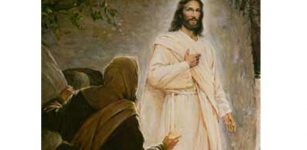 Ancient Manuscript Reveals: Jesus Was Married And Fathered Two Children With Mary Magdalene
Archaeology | Nov 10, 2014
Ancient Manuscript Reveals: Jesus Was Married And Fathered Two Children With Mary Magdalene
Archaeology | Nov 10, 2014 -
 First Early Roman Fortlet Found On The Isle of Anglesey, North Wales
Archaeology | Nov 26, 2015
First Early Roman Fortlet Found On The Isle of Anglesey, North Wales
Archaeology | Nov 26, 2015

